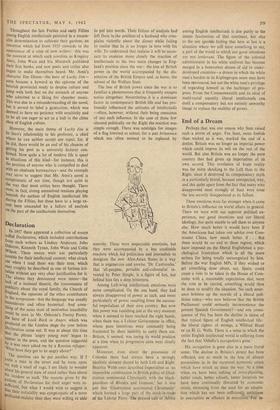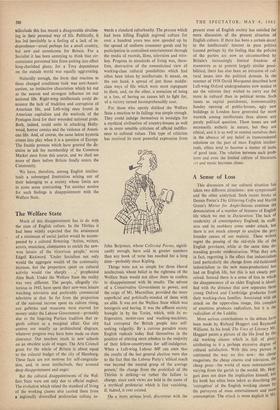End of a Dream
Perhaps that was one reason why Suez raised such a storm of anger. For Suez, more foolish than wicked as it was, marked the end of a dream. Britain was no longer an imperial power which could impose its will on the rest of the world. But also Britain was no longer the pure country that had given up imperialism of its own accord. This revelation of brute reality was far more shocking to the Left than to the Right, since it destroyed its compensatory myth in a particularly brutal, because unexpected, way, and this quite apart from the fact that many who disapproved most strongly of Suez were none the less secretly disappointed at its failure.
These emotions were far stronger when it came to Britain's influence on world affairs in general. There we were with our superior political ex- perience, our good intentions and our liberal ideology, but quite unable to sell them to anyone else. How much better it would have been if the Americans had taken our advice over Com- munist China, how much better if . . . But there would be no end to these regrets, which have imposed on the liberal Englishman a psy- chological frustration which is all the more serious for being totally unrecognised by him. Before the war English MPs, if they wished to get something done about, say, Spain, could cause a vote to be taken in the House of Com- mons with a reasonable expectation that, were the vote to be carried, something would then be done to modify the situation. No such assur- ance bolsters up the morale of a liberal poli- tician today—who now believes that the British Parliament could seriously inconvenience the present Spanish Government?—and one conse- quence of this has been the decline in status of that typical figure of English intellectual life: the liberal righter of wrongs, a Wilfred Blunt or an H. G. Wells. There is a sense in which the entire English intellectual world is suffering from the fact that 'Othello's occupation's gone.'
His occupation is gone also in a more literal sense. The decline in Britain's power has been reflected, not so much in the loss of distant possessions as in the recurrent economic crises which have struck us since the war. At a time when we have been talking of town-planning, better roads, better schools, better hospitals we have been continually thwarted by economic strain, stemming from the need for an adapta- tion which has not been sufficiently ambitious in conception or efficient in execution. For in- tellectuals this has meant a disagreeable straiten- ing in their personal way of life. Politically, it has led inevitably to a feeling of a lack of in- dependence—usual perhaps for a small country, but new and unwelcome for Britain. For a Socialist it has been annoying to think that cir- cumstance prevented him from putting into effect long-cherished plans; for a Tory dependence on the outside world was equally aggravating.
Naturally enough, the form that reaction to these changed conditions took was anti-Ameri- canism, an instinctive chauvinism which hit out at the nearest and strongest influence on our national life. Right-wing intellectuals could de- nounce the lack of tradition and corruption of American life, and Left-wing ones found in American capitalism and the warlords of the Pentagon food for their wounded national pride. Both, indeed, could unite in attacking Holly- wood, horror comics and the violence of Ameri- can life. And, of course, the same latent hysteria comes into play when it is a question of Europe. The frantic protests which have greeted the de- cision to ask for membership of the Common Market stem from this source, and we shall see more of them before Britain finally enters the Community.
We have, therefore, among English intellec- tuals a submerged frustration arising out of their belonging to a society whose limits are in some sense contracting. Yet another motive for such feelings is disappointment with the Welfare State.







































 Previous page
Previous page